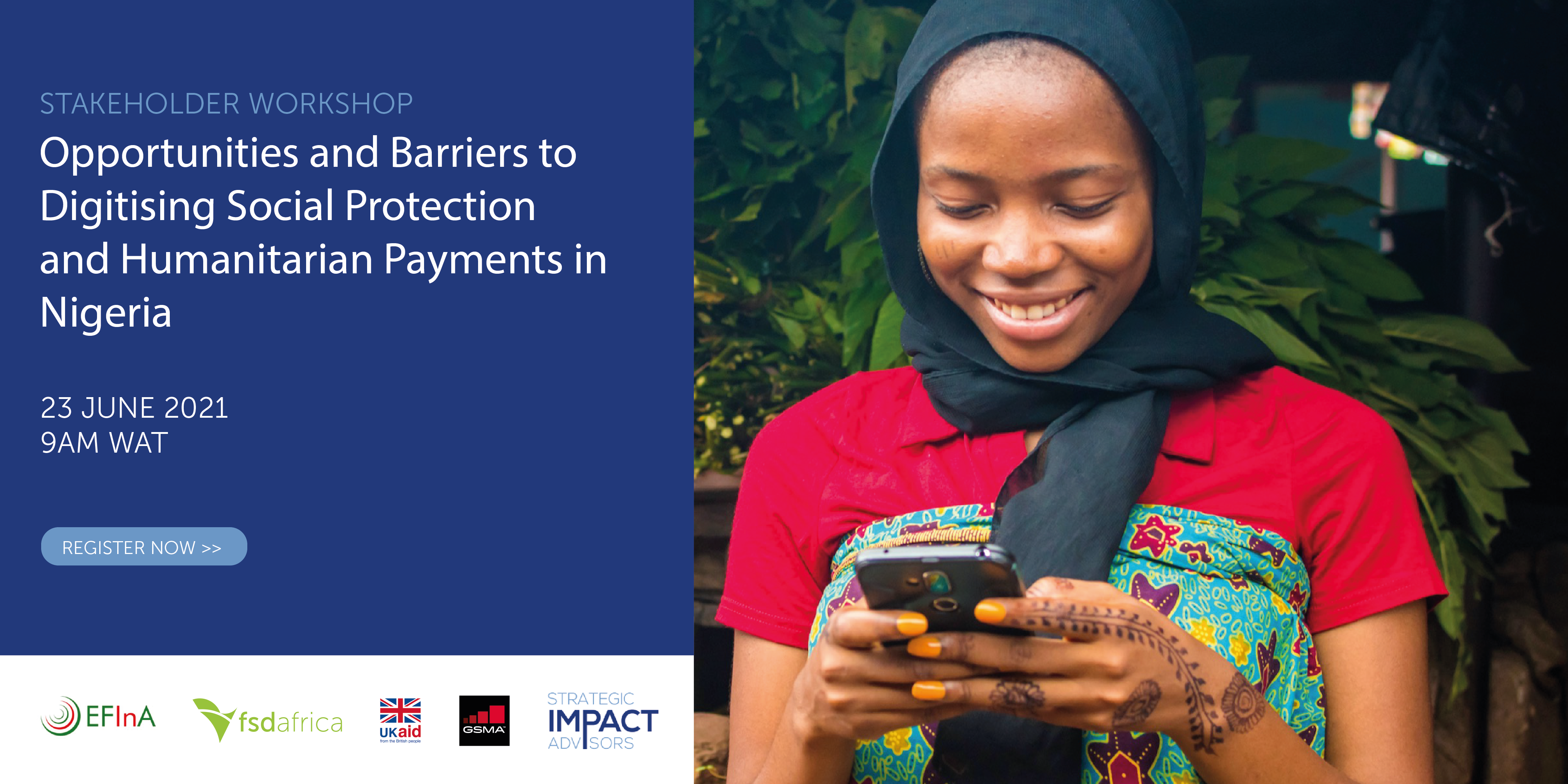Digitizing Social Protection and Humanitarian Payments in Nigeria

Author:
Jacqueline Jumah
Designation: Programme Head, Digital Financial Services at EFInA
In recent times, the environment
within which many social protection benefits beneficiaries reside is changing,
attributed to several factors including the desire to empowerment through
greater choice/options, the growth of trade in their communities facilitating
access to functioning markets as well as the proliferation of digital financial
services, among others. These have led to high beneficiary expectations of
support involving funds instead of food and other commodities. Digitizing
payments offers easier and speedy disbursement of funds to society, through
optimal and cost-effective distribution systems. This can also be a transformational tool for funds
beneficiaries, in improving their livelihood and addressing poverty.
In the last decade,
humanitarian organizations and the Nigerian government have disbursed social
protection funds to millions of vulnerable people in Nigeria. According to a
recent report by the National
Bureau of Statistics (2019 Poverty and Inequality in Nigeria), extreme poverty fueled by violent conflict,
climate shocks, and a strong neo-patrimonial distribution of wealth have left
40% of Nigerians living below the poverty line.
In response to
increasing inequality and food insecurity, both the national and state
governments of Nigeria and humanitarian organizations have rolled out cash
transfer interventions to boost social protection and food security for the
vulnerable in society. Cash transfer programs are often seen as opportunities
to introduce recipients to formal financial service, especially through digital
financial services offerings like wallets where they can receive funds and
manage spending. Yet the vast majority of both humanitarian and social
protection cash transfers are delivered to recipients in the form of physical
cash, deriving a single use case for interacting with formal financial
services.
Nigeria’s DFS landscape is atypical of its regional peers from being driven by a bank-led market. Mobile money as per GSMA’s definition which includes transferring money and making payments using the mobile wallet is still developing in Nigeria. The EFInA Access to Financial Services (A2F) highlights that mobile money in Nigeria is at 6% penetration and lags as compared to other markets as illustrated below. This complicates the delivery of digital funds transfers, given the DFS ecosystems surrounding recipients are not robust enough to facilitate and support digital payments.
Source: EFInA 2020 Access to Financial Services (A2F)
in Nigeria Survey
Cash transfer delivery
in Nigeria involves partnerships with financial service providers (FSPs), whose
role is to manage the disbursement of funds. However, the FSPs involved typically
create virtual, temporary accounts on behalf of recipients, which are usually
single-purpose, meaning they can only be used as a means to receive cash. When
FSPs receive funds from the organizations issuing the cash transfers, the FSPs
credit the virtual accounts of the recipients. During designated cash-out days,
recipients receive their funds in cash through Over-the-Counter (OTC) means
from FSP staff members or a few agents, usually by presenting a paper-based
quick response (QR) code or ID card. At the end of the programmes involved,
recipient virtual accounts are closed by the FSPs.
The overarching agenda
of funds transfer digitization in Nigeria is for recipients to receive funds
through a permanent digital wallet accessible on a mobile device where they can
transact, save and access other formal financial services. However, a
combination of factors restricts these digitization efforts. These include regulatory
and policy restrictions, challenges around low recipient readiness to receive funds
digitally, the unrelatable and minimal value proposition by (FSPs) in serving
recipients beyond the duration of funds transfer programs (beyond receiving
funds), and low government commitment and coordination to digitizing funds
transfers. It is important to understand
the barriers and opportunities to digitization, to effectively design viable
and sustainable strategies for the disbursement of funds to the vulnerable in
society.
EFInA, in
partnership with FSD
Africa, The GSMA Mobile
for Humanitarian Innovation (M4H) programme & WFP recently conducted an assessment of the
social protection and humanitarian payments landscape in Nigeria, to identify
opportunities for digitization and developed a report titled “Opportunities and Barriers to Digitizing
Social Protection and Humanitarian Payments in Nigeria”.
Join us for
a webinar session on Wednesday,
23rd June 2021 from 9 am to 11 am WAT, as we disseminate key findings revealing detailed
barriers to digitizing humanitarian and social protection transfers in Nigeria,
and present opportunities for making progress towards the end goal of making
humanitarian aid funding and payments easily accessible by those in need
through digitization. We are also looking to collectively deliberate on
executing the report recommendations with fellow stakeholders in this industry,
so kindly save the date!
Register via https://bit.ly/3zGdoj0

 Africas leading resource for digital financial services
Africas leading resource for digital financial services


comments